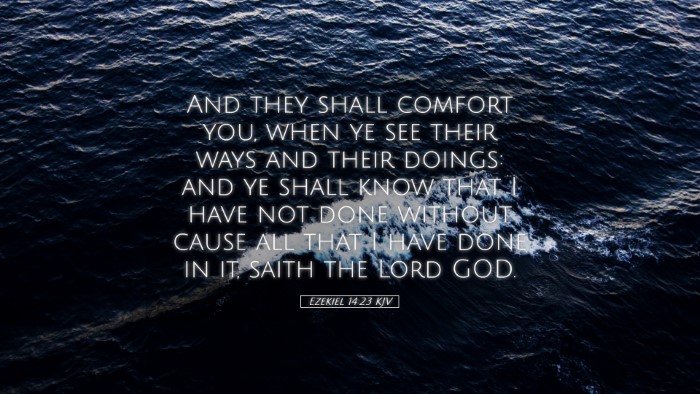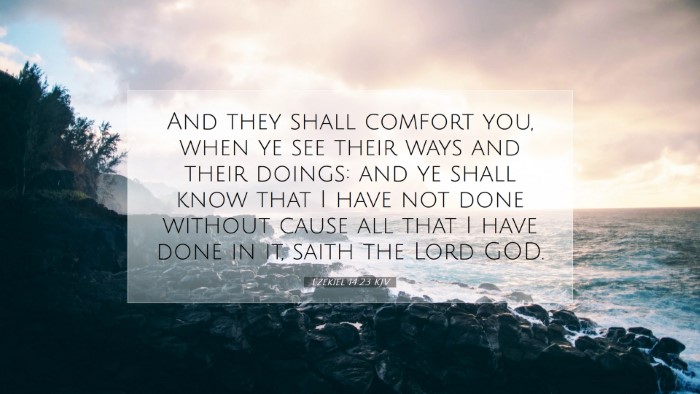Ezekiel 14:23 - Commentary
Verse Text: "And they shall consolation give you when you see their ways and their doings: and you shall know that I have not done without cause all that I have done in it, saith the Lord God."
Introduction
The prophetic book of Ezekiel, filled with vivid imagery and profound messages, reveals not only the judgment of God but also His mercy and the possibility of restoration. Ezekiel 14:23 serves as a pivotal verse that captures the essence of understanding God’s intentions behind His actions. This verse invites reflection on divine justice, human behavior, and the communication of hope amidst despair.
Exegesis of the Verse
The verse can be broken down into several key components that warrant exploration.
- Consolation: The idea of consolation in this verse suggests that, through observing the consequences of others’ actions, one can find comfort in understanding God’s reasons.
- Recognition of Divine Sovereignty: The phrase “I have not done without cause” indicates that God's actions are deliberate and purposeful, functioning within His sovereignty and wisdom.
- Awareness of Human Conduct: The reference to "their ways and their doings" highlights the importance of examining how human behaviors align with divine expectations.
Insights from Matthew Henry
Matthew Henry, in his comprehensive commentary, emphasizes the importance of learning from the judgments and outcomes witnessed in the lives of others. He underscores the role of observation to gain insight into God’s nature and human failure:
- Henry indicates that observing the outcomes of sinful behaviors serves a dual purpose: it acts as a solemn warning to others while simultaneously elucidating God’s justice and fidelity to His covenant.
- He asserts that understanding the reasons behind God's punitive measures leads to greater acknowledgment of His holiness and righteousness.
- This understanding can transform despair into hope for individuals, as they see that God’s acts, even in judgment, are always rooted in justice and mercy.
Insights from Albert Barnes
Albert Barnes provides a nuanced interpretation that aligns with Henry’s reflections while adding layers of theological significance:
- Barnes highlights the involvement of both divine sovereignty and human responsibility. He notes that the recognition of God's actions serves to educate and admonish the faithful regarding the principles of divine justice.
- He reinforces that knowledge of God’s reasons can act as a corrective for those who may feel disheartened or confused by their current circumstances.
- Moreover, Barnes posits that understanding God’s purpose in judgment leads to a profound acknowledgment of His covenantal faithfulness, transforming fear into reverence and gratitude.
Insights from Adam Clarke
Adam Clarke's commentary adds a more pastoral perspective that resonates with the emotional dimensions of this verse:
- Clarke points out that the Lord's intent is not merely punitive but also corrective, pushing toward genuine repentance and renewal.
- He suggests that evidence of God’s judgments, as seen in the lives of those who turn from Him, helps to fortify the faith of the believers, providing both a warning and a reminder of the gravity of sin.
- In Clarke’s view, the ultimate goal of God’s actions is restoration; as people witness the end results of transgression, they are drawn back into a spirit of humility and submission to God’s will.
Theological Reflections
Considering the insights provided by these commentators, several theological implications can be drawn from Ezekiel 14:23:
- The Nature of God: God’s actions are intentional and reflect His holy nature, inviting believers to trust in His wisdom even when circumstances seem bleak.
- The Role of Suffering: The grim realities faced by the people carry a significant message about the consequences of sin, urging the faithful to discern between judgment and grace.
- Community Reflection: This verse serves as a communal call for accountability amongst believers, fostering an environment where divine truth can transform behaviors collectively.
- Hope in Judgment: Even in moments of divine displeasure, there is an underlying expectation of hope for restoration; the faithful are encouraged to seek understanding while also expecting God’s mercy to prevail.
Application for Today’s Audience
For pastors, theologians, and students, Ezekiel 14:23 offers rich lessons applicable in various contexts:
- Courage to Address Sin: Leaders are called to speak truth into their communities, encouraging a posture of repenting and learning from the mistakes highlighted in the lives of others.
- Encouragement for the Struggling: This verse reassures those undergoing trials that understanding God’s ways can lead to spiritual comfort and growth.
- Awareness of Witness: Recognizing that our behaviors reflect on our understanding of God emboldens believers to pursue holiness and wisdom.
- Discourse on Divine Justice: Scholars have an obligation to educate others about the complexity of divine justice as an integral facet of God’s relational engagement with humanity.
Conclusion
Ezekiel 14:23 serves as a timeless reminder of the importance of understanding God’s ways through the lens of observation and divine truth. As we delve deeper into scripture, may we find solace in knowing that God’s judgments are purposeful and that through studying these events, we can emerge with greater faith, understanding, and a commitment to living out our beliefs in a way that honors Him.


